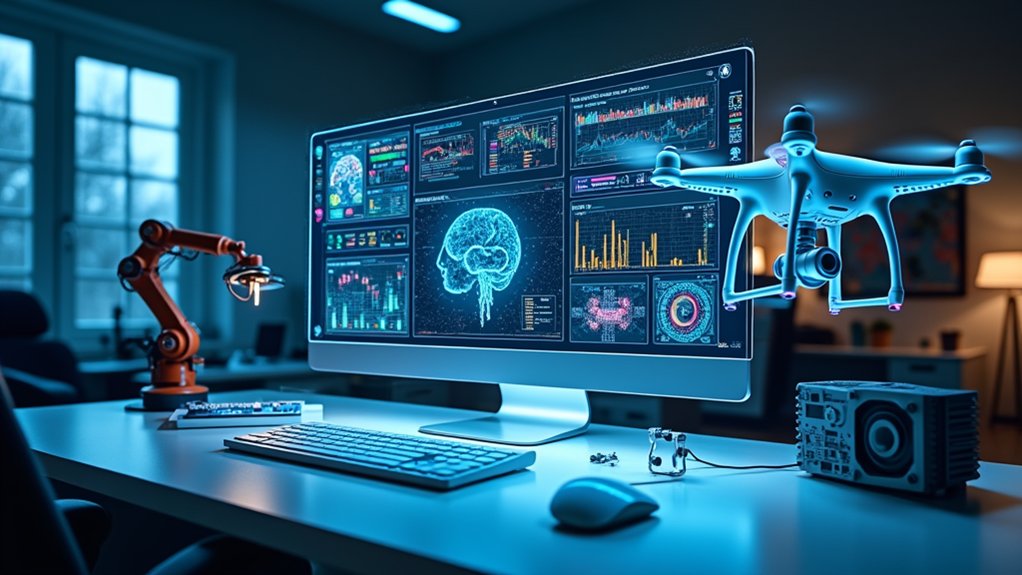How to Use Artificial Intelligence?
Artificial intelligence implementation requires strategic adoption across various sectors. In education, AI enables personalized learning pathways and automated assessment. Healthcare applications include diagnostic tools and treatment plan optimization. Transportation systems benefit from autonomous vehicle technologies and traffic management algorithms. Agricultural AI includes precision farming and crop monitoring. Financial institutions utilize AI for fraud detection and regulatory compliance. Each application demands appropriate tools, data infrastructure, and domain expertise to maximize effectiveness. Deeper understanding reveals transformative potential in virtually every industry.

Artificial intelligence has transformed numerous industries and sectors, offering powerful solutions to complex problems previously considered intractable. Organizations seeking to utilize AI technologies must first identify specific operational challenges that would benefit from intelligent automation, data analysis, or predictive capabilities.
Educational institutions implement adaptive learning platforms that customize content difficulty based on individual student performance metrics, while simultaneously automating essay grading through sophisticated natural language processing algorithms. These systems create personalized learning pathways by analyzing cognitive strengths and identifying at-risk students through predictive analytics.
In healthcare environments, AI deployment focuses on diagnostic tools that analyze medical imaging for early disease detection and monitor patient essentials in real-time to flag anomalies requiring intervention. Healthcare providers utilize AI to create personalized treatment plans based on genetic data analysis and enhance telemedicine platforms with symptom-checking assistants that facilitate effective patient triage. By 2025, the healthcare sector will see expanded telehealth solutions designed to improve accessibility for underserved populations.
Transportation systems benefit from AI through computer vision technologies that enable autonomous vehicles to detect objects and obstacles, while traffic management algorithms enhance flow through congested urban areas. Organizations in this sector implement predictive maintenance systems that analyze sensor data to anticipate vehicle failures before they occur.
Agricultural enterprises employ precision farming techniques through AI-powered drones and satellites that monitor crop health and detect nutrient deficiencies across large cultivation areas. Automated irrigation systems adjust watering schedules based on soil moisture data, while predictive algorithms determine ideal planting dates and crop selections for specific environmental conditions. Advanced AI technologies also enable farmers to implement smart logistics that optimize harvesting, storage, and distribution processes.
Financial institutions implement machine learning models to detect fraudulent transaction patterns and deploy conversational AI for customer service applications. These organizations also utilize natural language processing to analyze regulatory documents for compliance requirements and develop algorithmic trading systems based on real-time market data analysis.
Security operations centers train convolutional neural networks to identify suspicious activities in surveillance footage and implement anomaly detection systems that identify network intrusions in real-time, creating thorough protection against both physical and digital threats. Evaluation professionals can benefit from a hands-on approach to learning AI tools through specialized courses that demonstrate practical applications in data analysis and reporting.
Frequently Asked Questions
Can AI Completely Replace Human Creativity and Intuition?
AI cannot completely replace human creativity and intuition. Despite outperforming humans in standardized creativity tests, AI lacks genuine intent, emotional authenticity, and lived experiences that inform truly innovative creation.
AI systems operate within generative boundaries, dependent on existing datasets rather than original imagination. Human judgment remains essential for ethical, cultural, and contextual decision-making, with ideal results emerging from hybrid workflows that combine human strategic oversight with AI-driven execution.
How Much Coding Knowledge Is Required to Implement AI?
Implementing AI requires varying levels of coding knowledge depending on the specific application.
Basic implementations using pre-built frameworks like TensorFlow or PyTorch demand understanding of programming fundamentals, while advanced custom systems necessitate expertise in algorithms, mathematics, and specialized languages.
The spectrum ranges from minimal coding for API connection and no-code platforms to extensive programming skills for developing novel architectures, optimizing performance, and addressing complex requirements in production environments.
What Are the Ethical Boundaries When Deploying AI Systems?
Ethical boundaries when deploying AI systems include four critical domains: data transparency, algorithmic fairness, human oversight, and post-deployment responsibility.
Organizations must disclose data sources, conduct bias audits, maintain human intervention capabilities, and implement continuous monitoring protocols.
These boundaries require developers to balance innovation with protection of privacy, prevention of discrimination, and accountability for AI-driven decisions.
Regular transparency reporting and diverse stakeholder engagement further guarantee AI systems operate within acceptable ethical parameters.
How Reliable Are AI Predictions in Unpredictable Situations?
AI predictions face significant limitations in unpredictable scenarios due to data biases, unmodeled external factors, and narrow training scopes.
Reliability diminishes when models encounter novel situations outside their training parameters. Techniques like uncertainty quantification, ensemble methods, and human-informed oversight can mitigate these limitations.
Cross-validation and sensitivity analysis help validate model performance, but dynamic systems like markets and human behavior fundamentally resist deterministic modeling, necessitating caution when deploying AI in volatile environments.
Will AI Development Eventually Lead to Technological Unemployment?
Historical evidence indicates AI will likely cause significant job displacement while simultaneously creating new roles in emerging sectors.
Projections suggest AI may eliminate 300 million positions globally while generating 11 million technology-focused opportunities. The impact varies substantially across industries, with business services and financial operations facing higher risks than fields like life sciences.
This technological shift will necessitate extensive workforce retraining programs, since approximately 12.6% of U.S. jobs require immediate reskilling to remain viable.